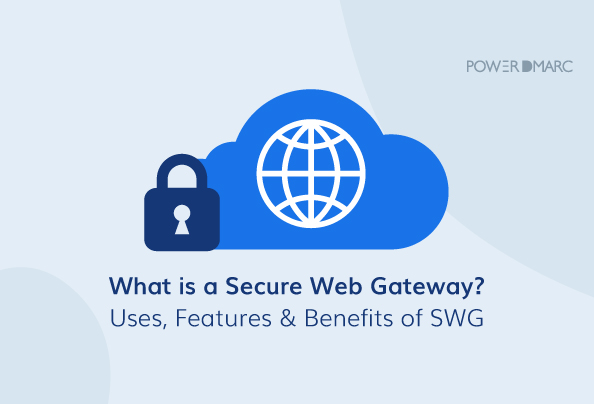Industry leaders and cybersecurity experts anticipate the global cybercrime damage cost to increase by 15% per year over the next three years, translating into a loss of USD 10.5 trillion by 2025. Figures like these are loud alarms for organizations to adopt cybersecurity technologies like a secure web gateway or SWG (pronounced as swig), which examines and blocks internet traffic to safeguard users from cyber menaces like malware injection and ransomware.
So, here’s a detailed guide on what a secure web gateway is and why IT-driven companies should care to implement it.
What is a Secure Web Gateway?
A secure web gateway is an on-premise or cloud-based technology that inspects, filters, and controls internet traffic. It also executes corporate and regulatory policy compliances for safer internet navigation. A next gen secure web gateway’s main capabilities are URL filtering, antimalware and threat prevention, and application access control. It scans downloadable files and checks if a link is safe by comparing them against a database of malware signatures. It outrightly blocks downloads upon malware detection.
A secure web gateway is available in the form of physical servers, software, and cloud-driven virtual machines and services. Irrespective of their form and style of operation, all secure web gateways work almost in the same way.
How Does a Secure Web Gateway Work?
A secure web gateway works by examining traffic coming from client devices that try to connect to internet services. So, every outgoing connection request first passes through the SWG, where it checks the URL against a list of links and policies. If the URL is evaluated as ‘safe’ and ‘allowed’ by policy, it passes the filter and is given access. If not, it’s blocked. Incoming data also undergoes a similar examination process before reaching the users.
SWGs also help enforce security policies by blocking non-HTTPS websites. The primary difference between HTTPS and non-HTTPS websites is that the former is more secure than the latter, making it easier for hackers to intercept and exploit data from non-HTTPS websites.
Lastly, the logged anomalies and potentially threatening user activities are further monitored and reported for forensic analysis and similar purposes.
Features of a Secure Web Gateway
The secure web gateway technology aims to strengthen cybersecurity by a host of below-shared features:
- URL Filtering: The URL filtering feature restricts access to malicious websites, classifying web traffic as permitted, denied, malicious, or unknown.
- Antivirus: An antivirus software as a part of a SWG, prevents, detects, and deletes evil-intended software like viruses, spyware, adware, etc.
- Antimalware: Antimalware programs in secure web gateways can be engineered to block out websites that may cause potential harm due to the presence of malicious code or software.
- Sandboxing: As a part of a SWG, sandboxing limits vulnerabilities by not allowing malware or malicious code to infiltrate your website’s content or communicate with operating systems.
- Data Loss Prevention (DLP): DLP in SWG prevents the unauthorized disclosure or leakage of sensitive and confidential information that is already within an organization.
6 Prominent Benefits of a Secure Web Gateway
Deployment of a secure web gateway aids organizations in establishing a secure internet infrastructure along with other benefits that are listed below-
-
Simplified Cybersecurity
A cloud-based next generation secure web gateway eliminates the constant demand for setting up and managing hardware or virtual appliances. You no longer have to take care of configuring, overseeing, replacing, or upgrading them after every 3-4 years. This consequently contributes to cost deductions and saves time that can be utilized in taking care of other productive responsibilities. Incorporating cloud application development services seamlessly enhances the effectiveness of secure web gateways, ensuring robust protection against cyber threats.
-
Scalability and Performance
Secure web gateways are designed in a way that they align well with the growing needs of an organization and impart high-performance solutions to deal with the expanding web traffic. While handling all this, it also ensures to maintain low latency for a seamless and secure user experience.
-
Smooth Integration with Security Software
Next gen secure web gateways can easily integrate with other security solutions, like firewalls, endpoint protection, email authentication protocols like SPF, DKIM, DMARC, BIMI, and SIEM (Security Information and Event Management) systems, to stitch together a well-bound security system.
These security solutions complement each other, hence, their integration enhances overall threat visibility and response capabilities.
-
Remote User Protection
The remote-working culture is receiving a great response. This modern work-from-home concept demands extended protection for remote employees, and secure web gateways facilitate the same regardless of location.
Say, for example, an employee has received a fraudulent email injected with malware links. The threat detection and filter mechanisms of a secure web gateway would analyze the link in real-time and block access or disallow its installation on their computer, preventing the employee from falling victim to a phishing attack
-
Compliance and Reporting
Certain industries, regions, and governments have specific regulations or compliance requirements that directly or indirectly necessitate the deployment of secure web gateways. HIPAA, PCI DSS, and GDPR also strongly encourage SWGs for network security and compliance.
-
Bandwidth Management
SWGs can optimize network bandwidth by controlling and prioritizing web traffic. This is particularly useful in preventing non-essential applications or websites from consuming excessive bandwidth, ensuring a smooth and efficient network operation.
Final Words
The internet has many faces, and its usage against righteousness is a concern that has been bothering users right from its inception. The scenario is expected to grow worse with the introduction of AI. Hence, investing in cybersecurity technologies like next generation secure web gateways has become all the more crucial for mitigating online risks, safeguarding sensitive data, and ensuring a resilient and secure IT infrastructure.
- SMTP Error Codes Explained - May 20, 2024
- 10 Best Email Protection Tips and Strategies - May 15, 2024
- Can Blockchain Help Improve Email Security? - May 9, 2024
